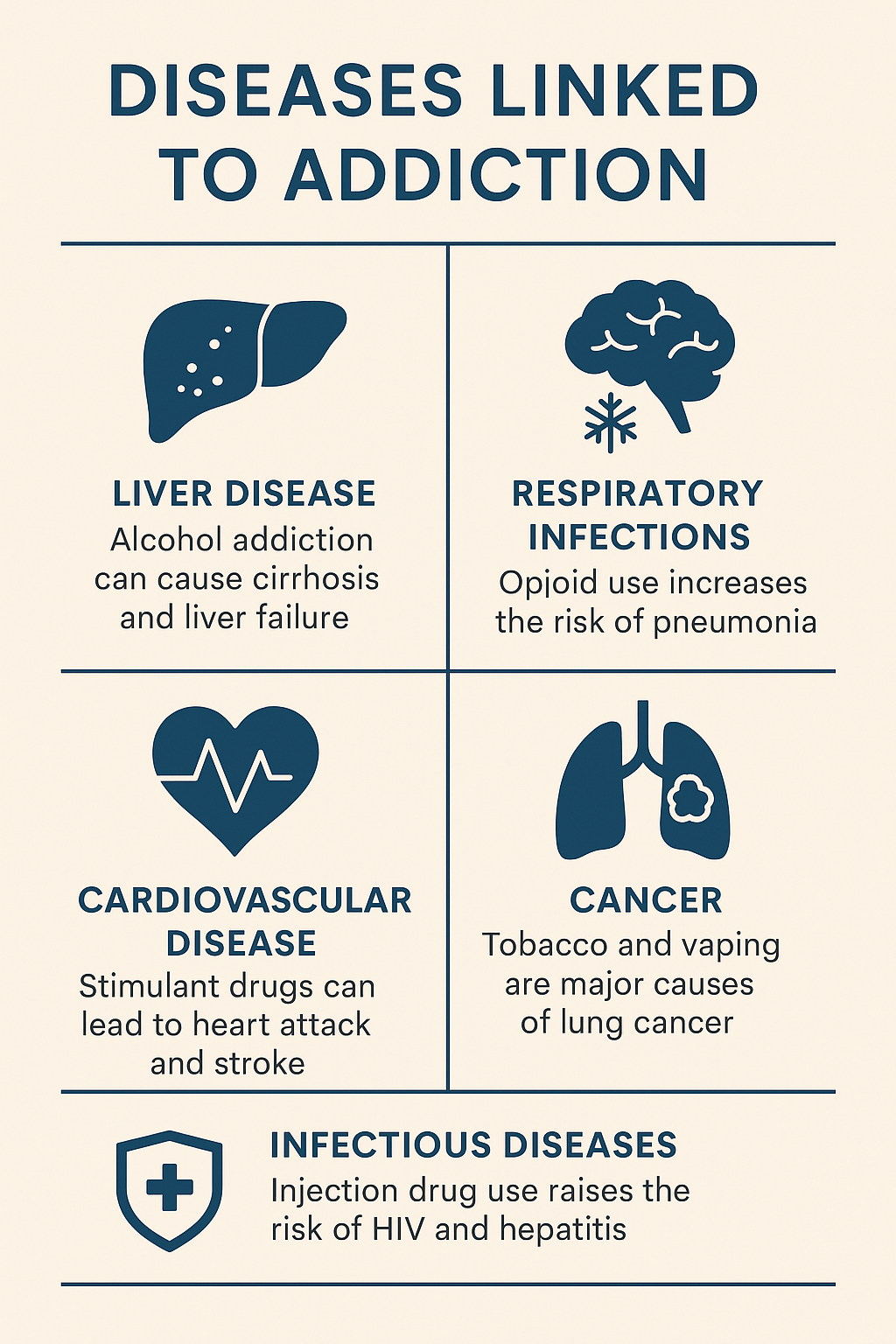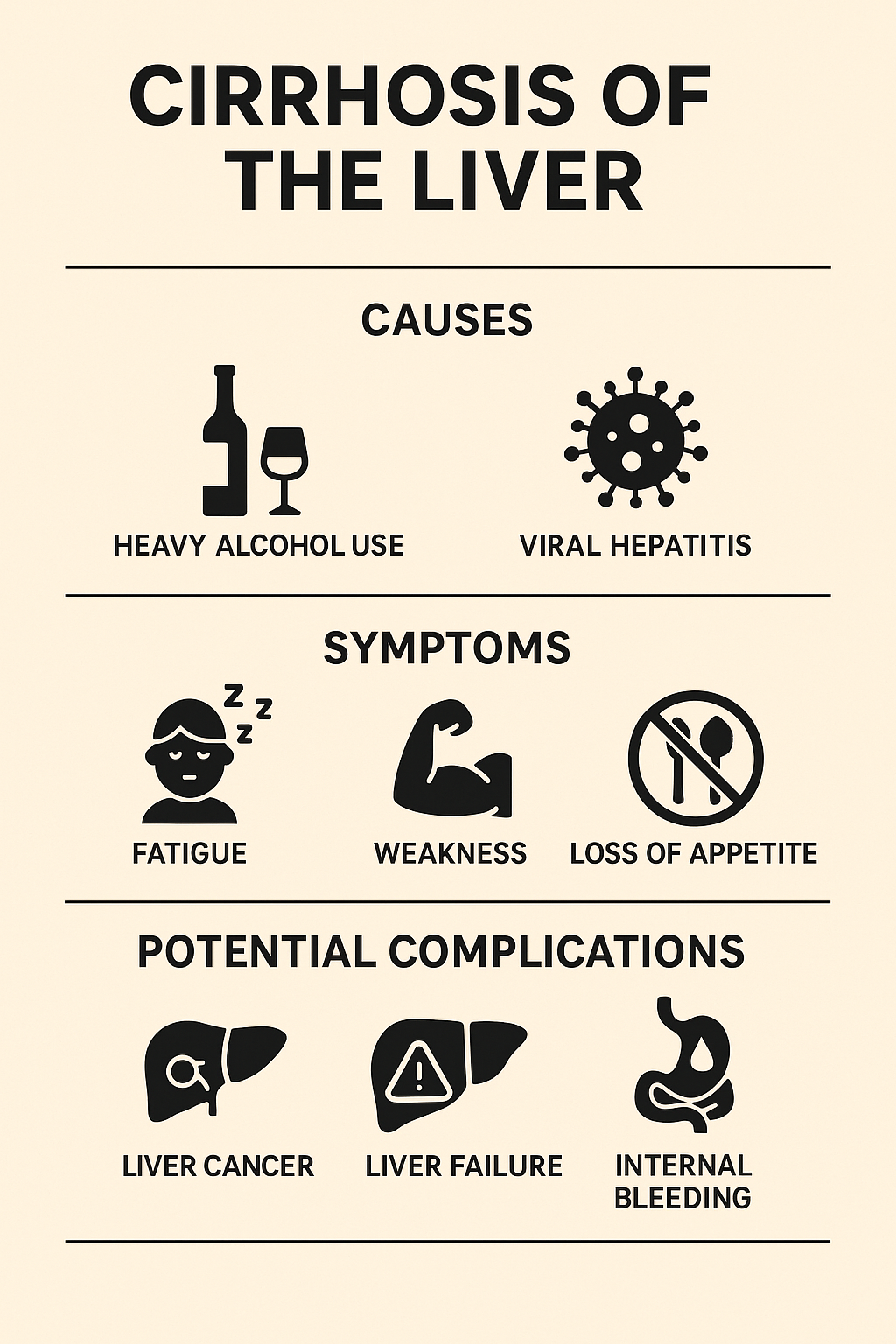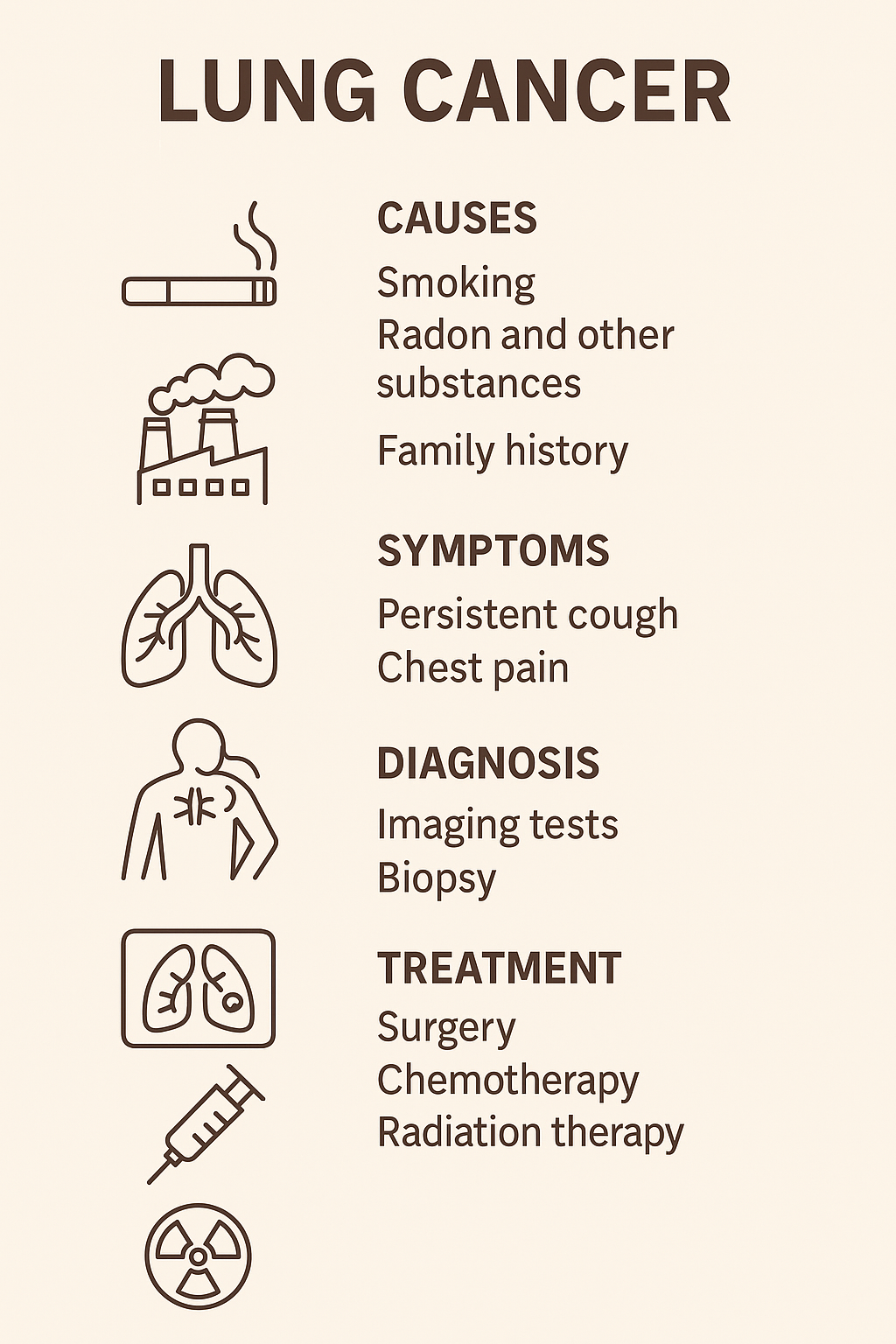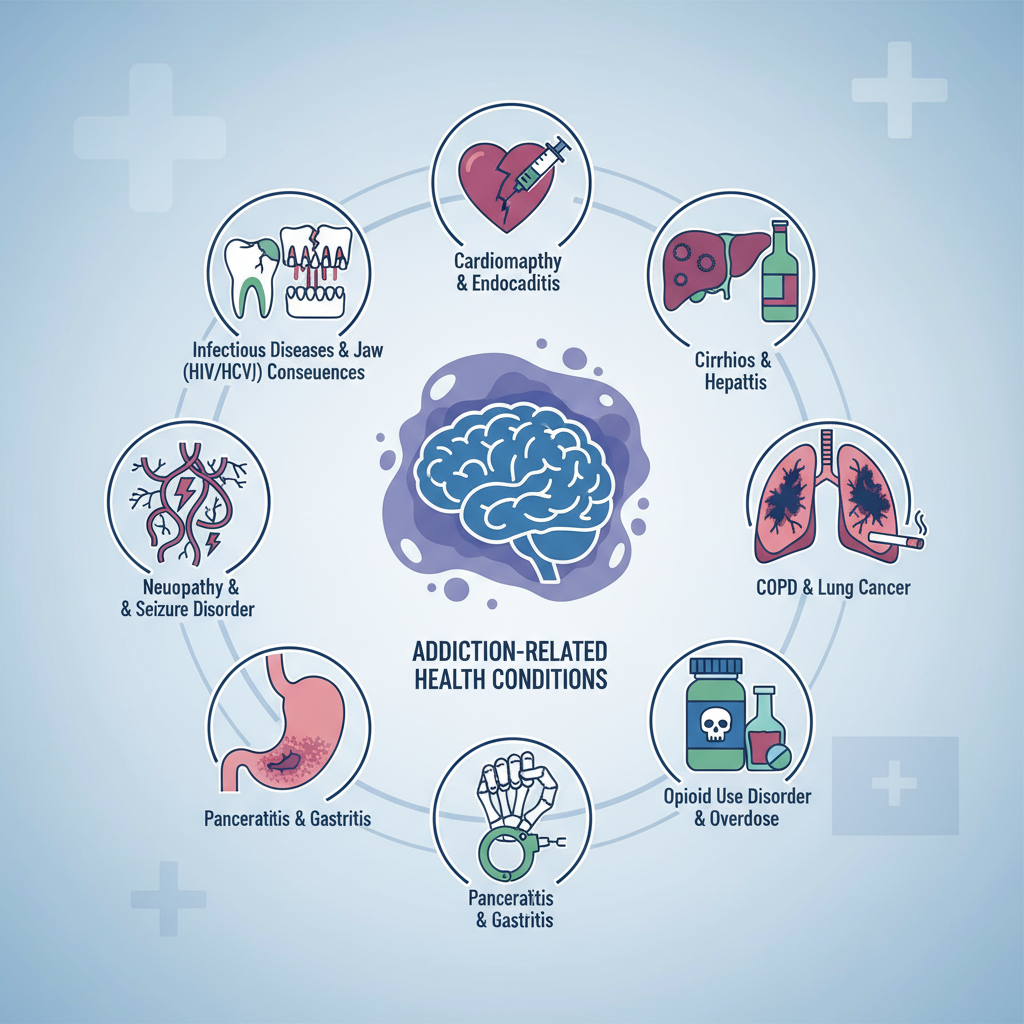Addiction is often misunderstood as personal choice or lack of willpower. Still, in reality, it connects deeply with actual health conditions that create lasting impacts well beyond the initial use of a substance or addictive behavior. Over decades, researchers and doctors have come to see diseases tied to addiction as complicated, affecting not just the brain, but the body and social connections too. If you want to know what’s happening inside the body when addiction takes over, or you’re eager to understand better and support someone who’s struggling, you’ve come to the right place.
Understanding Diseases Related to Addiction
Addiction isn’t limited to drugs and alcohol. It covers a wide range of substances and behaviors, all packed with significant health risks. When someone develops an addiction, their brain chemistry actually changes, making it much more challenging to quit than simply choosing to stop. Leading public health agencies, including the World Health Organization, now call addiction a chronic disease. This condition can both trigger and intensify other health problems throughout the body.
Some diseases commonly show up after years of addiction, and every different substance—like alcohol, nicotine, or opioids—brings its own health dangers. Behavioral addictions, such as gambling or gaming, while sometimes overlooked, can cause significant mental and physical challenges.
Here are some of the most common diseases linked to addiction:
- Alcohol Use Disorder leading to liver disease, pancreatitis, heart issues, and certain cancers
- Opioid Use Disorder raises the chances of infectious diseases and overdose
- Nicotine Addiction leads to cardiovascular disease, stroke, lung cancer, and respiratory illness
- Psychostimulant Addiction brings on serious heart problems and mental health conditions
- Behavioral Addictions, like gambling, which bring significant emotional and social fallout
How Addiction Triggers Disease in the Body
Frequent, long-term use of addictive substances or behaviors can knock your body out of its natural rhythm. Let’s break it down:
- Brain Changes: Continuous exposure to drugs or addictive behaviors overloads brain reward systems, dropping natural dopamine levels. This makes it harder to feel pleasure and ramps up cravings.
- Weakening the Immune System: Substances such as alcohol and opioids make infections easier to catch. For instance, people may be more susceptible to chronic diseases, including pneumonia.
- Organ Damage: Alcohol and tobacco put repeated strain on organs. Long-term drinking can cause fatty liver, hepatitis, or cirrhosis. Smoking harms the lungs and blood vessels, raising the risk of bronchitis and heart issues.
- Mental Health Impacts: Addiction and mental health problems often go hand in hand. Depression, anxiety, or even psychosis are common among those with substance use disorders. Each can feed into the other, sometimes making it difficult to pinpoint where it began.
Key Diseases Frequently Linked to Addiction
Let’s get into the details—certain diseases are especially likely to show up when specific addictions are present. Here’s a closer look:
Alcohol-Related Diseases
Heavy, ongoing drinking takes a toll on nearly every organ. Some of the main health problems include:
- Liver Disease: Fatty liver, hepatitis, fibrosis, and cirrhosis all show up more in those who drink heavily
- Pancreatitis: An Inflamed pancreas disturbs digestion and insulin production
- Cardiovascular Problems: High blood pressure, irregular heartbeat, and a higher heart attack are frequent dangers
- Cancers: Drinking raises the odds of mouth, throat, liver, and breast cancer
- Brain Damage: Long-term alcohol misuse harms memory, learning, balance, and coordination
Diseases Related to Drug Addiction
- Opioid Addiction: On top of overdose risk, opioids slow breathing, cause digestive trouble, and increase the chances for hepatitis and HIV (primarily through shared needles)
- Stimulant Addiction (like meth or cocaine): This can lead to stroke, heart attack, anxiety spikes, and sometimes movement problems similar to Parkinson’s disease
- Benzodiazepine Addiction: Chronic use can trigger memory loss, ongoing drowsiness, and a higher risk of injury
Nicotine and Tobacco-Linked Diseases
- Lung cancer
- Chronic Obstructive Pulmonary Disease (COPD)
- Stroke
- Heart disease
- Peripheral artery disease
Chewing tobacco and vaping come with their own sets of cancer and heart risks.
Mental Health Conditions Associated with Addiction
Psychiatric struggles crop up alongside addiction. These are sometimes referred to as co-occurring disorders, also known as a “dual diagnosis.”
- Depression: Chronic substance use can create ongoing depressive symptoms or intensify existing ones
- Anxiety Disorders: Drug use can set off nonstop worry, panic attacks, or social anxiety
- Psychosis: Some drugs, especially stimulants, may cause paranoia or hallucinations
Spotting the Early Signs: When to Get Help
Diseases connected to addiction typically creep in rather than appear suddenly. The earlier a problem is noticed, the easier it is to prevent things from spiraling out of control or undo some of the damage.
Be on the lookout for warning signs that show a disease might be taking hold:
- Frequent illnesses or a longer time recovering from minor problems
- Sudden weight loss or weight gain
- Mood swings, aggression, or ongoing depression
- Struggles with memory, making decisions, or staying focused
- Physical changes like trembling, excess sweating, or changes in skin color
If these signs appear in you or someone close to you, consider consulting a healthcare professional. These days, more health providers know what to look for and how to help, making it easier to find the proper support.
Significant Challenges in Addressing Diseases Linked to Addiction
Finding help isn’t always simple. There are several challenges that people run into:
- Stigma: Shame or worry about what others will think can make asking for help a tough decision. Old stereotypes still linger, which makes it harder for people to reach out.
- Access to Healthcare: Not everyone has access to affordable, reliable care nearby. When there’s little support, the disease gets worse.
- Misdiagnosis: Symptoms might just get labeled as “just addiction,” but sometimes another treatable illness is hiding underneath the surface.
- Relapse: After treatment, some people return to substance use. Brain changes can persist for a while, so ongoing, long-term support is often necessary for lasting recovery.
Building Recovery: What Really Matters
Success usually comes with teamwork. Doctors, nurses, counselors, family, and support groups all chip in. The most up-to-date programs consider the whole person, integrating physical health and emotional wellness. Here are a few steps that help most:
- Integrated Treatment: Tackling both addiction and health conditions at once leads to better outcomes
- Counseling: Approaches like Cognitive Behavioral Therapy help people notice harmful patterns and swap them out for healthier ones
- Medication: Drugs such as methadone for opioid addiction can make withdrawal bearable and help protect the organs
- Peer Support: Groups like AA, NA, and SMART Recovery offer friendship, advice, and encouragement
Frequently Asked Questions
Lots of people want answers about addiction and the diseases that come with it. Here are some common questions:
Question: Is addiction really considered a disease?
Answer: Yes. Medical experts officially call addiction a chronic brain disease. Willpower alone isn’t enough to break free, but with support and the right tools, people can recover and manage it.
Question: Can health problems caused by addiction get better or reverse?
Answer: In some cases, yes. Health can rebound from issues such as fatty liver if the substance is stopped early enough, but not all illnesses are reversible—severe organ damage or cancer may need care for life. Catching things early increases the chance of a better recovery.
Question: Is it possible to recover from both addiction and other health issues at the same time?
Answer: Absolutely. With a team approach—combining medicine, therapy, and peer support—people can manage both conditions simultaneously. Many treatment centers now focus on comprehensive, all-in-one care.
Finding Trusted Support and More Information
If you or a loved one is having trouble, these places can help you track down reliable help:
- Substance Abuse and Mental Health Services Administration (SAMHSA)
- National Institute on Drug Abuse (NIDA)
- Local doctors and clinics—many offer free or affordable evaluations and resources
- Peer groups, both online and in your community, can support lasting change
Diseases linked to addiction aren’t just about the substance or action. The health consequences can build up over time. The good news is that with up-to-date information and real support, you can put your health and life on a better path.
Video: The Hidden Dangers of Addiction Nobody Warns You About



